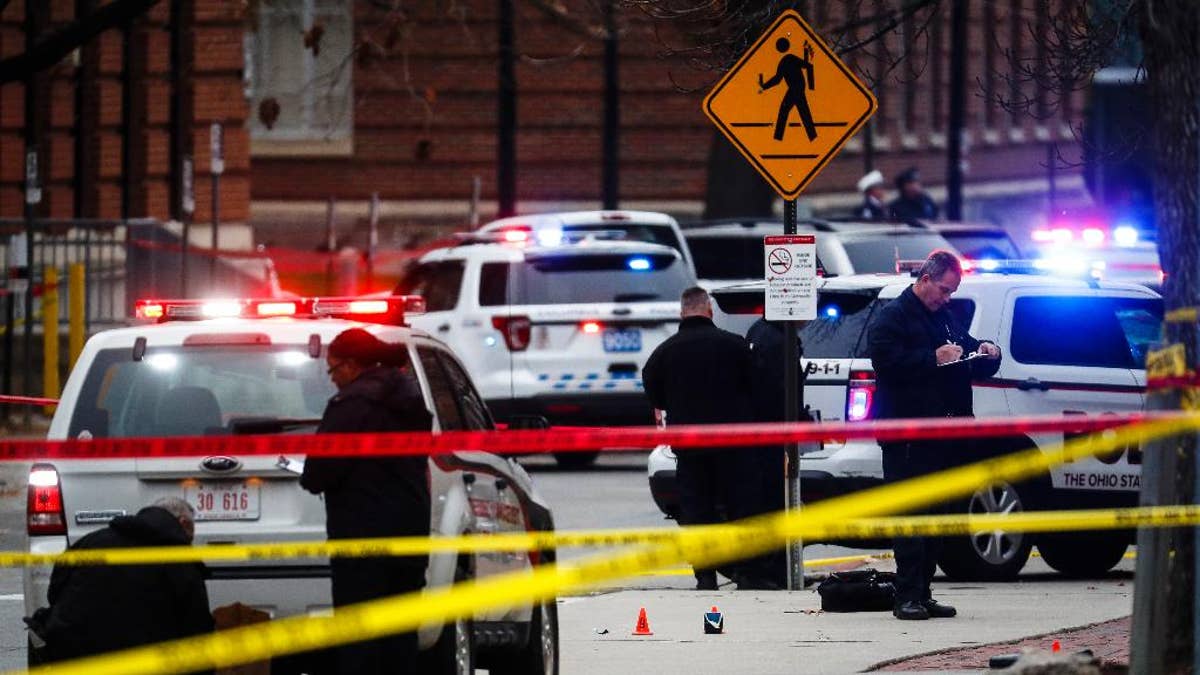
FILE - In this Nov. 28, 2016, file photo, crime scene investigators collect evidence from the pavement as police respond to an attack on the Ohio State University campus in Columbus, Ohio. Franklin County, Ohio, Prosecutor Ron O'Brien announced Wednesday, May 3, 2017, that a grand jury has cleared Alan Horujko, the Ohio State University Police officer who fatally shot the man responsible for a Nov. 28, 2016, car-and-knife attack at the university that injured 13 people, Abdul Razak Ali Artan. (AP Photo/John Minchillo, File) (The Associated Press)
COLUMBUS, Ohio – A man responsible for a car-and-knife attack at Ohio State University last year left behind a torn-up note in which he urged his family to stop being "moderate" Muslims and said he was upset by fellow Muslims being oppressed in Myanmar, The Associated Press has learned.
Abdul Razak Ali Artan also told his parents in the note, reassembled by investigators, that he "will intercede for you in the day of Judgment," according to the investigative case file of the attack obtained through an open records request.
"My family stop being moderate muslims," says the handwritten note transcribed by investigators and found by Artan's bed in his family's apartment.
Artan also wrote: "In the end, I would like to say that I pledge my allegiance to 'dawla,'" an Arabic word that means state or country and a likely reference to the Islamic State group. "May Allah bless them."
He concludes by saying he's leaving his property to his beloved "but yet 'moderate mother.'"
Artan's family was baffled by that note, which caused them a great deal of anguish, said Bob Fitrakis, a Columbus attorney representing the family. To this day, the family has no idea why Artan took those actions, he said Thursday.
"The family is mystified by what happened. They're absolutely clueless," Fitrakis said.
The 18-year-old Artan was shot and killed by an Ohio State officer moments after driving into a crowd on Nov. 28 and then attacking people with a knife, leaving thirteen injured.
In a series of Facebook rants previously reported, Artan nursed grievances against the U.S. "If you want us Muslims to stop carrying lone wolf attacks, then make peace" with the Islamic State group, he warned in those posts in which he also railed against U.S. intervention in Muslim lands.
Artan posted those comments at 9:49 a.m. on Nov. 28, three minutes before the attack began, according to an unclassified FBI report showing the time line of the attack that was released through the open records request.
One of his brothers saw those comments and tried too late to contact him, thinking maybe it was a joke or his account had been hacked, Fitrakis said.
The records provided new details about Artan, including a visit he made to Washington, D.C., a few days before the attack where he also made unidentified purchases at a Walmart. The family didn't realize he'd traveled there, has no idea why he went, and urges anyone with information about that trip to contact authorities, Fitrakis said.
The day before the attack, Artan left his job at a nearby Home Depot, saying he was tired, a co-worker told investigators. This was unusual, "as he never left early from work," the co-worker said. Artan had told the co-worker several times that fall he was disgruntled with school and wanted to drop out, according to the records.
The morning of the attack, Artan bought a set of knives, a tomato and a cucumber at 7:20 a.m. at a Walmart on the west side of Columbus, with his movements captured by video and photos and released in response to the AP's records' request.
The "suspect was pleasant and very polite during the checkout process," the Walmart cashier told investigators.
At 7:50 a.m., Artan dropped his sister at a high school near their home on the city's west side. He paid a brother $40 he owed him around 9:30 a.m., when the brother last saw him, according to FBI records.
After arriving on campus, Artan drove his brother's Honda Civic over a curb and into a crowd of people and crashed it into a planter. Artan then got out and started slashing at people with an eight-inch knife, records show. In a coincidence, a nearby building had been evacuated because of a reported gas leak.
"I'm going to . . . kill you," Artan told one female student, using an expletive, the records show.
Somali-born Artan came to the U.S. in 2014 as the child of a refugee. He had been living in Pakistan from 2007 to 2014.
Authorities believe Artan's attack was partly inspired by an American-born cleric killed in a U.S. drone strike in Yemen.









































